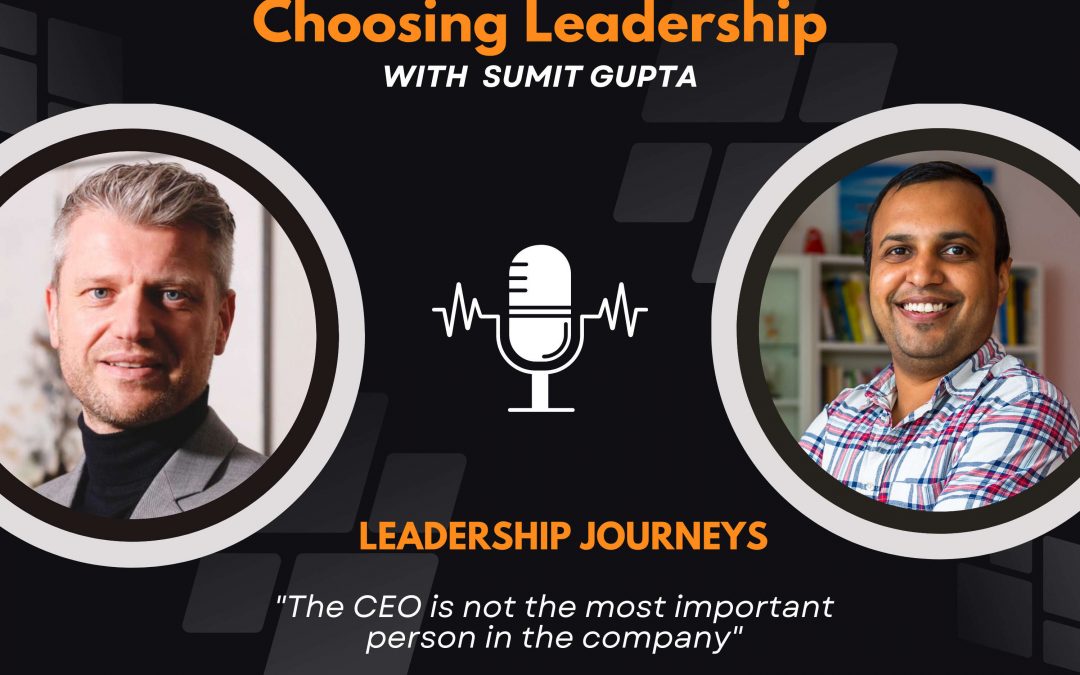This is the Leadership Journey series on the Choosing Leadership Podcast.
I believe we all have a lot to learn from each other’s stories – of where we started, where we are now, and our successes and struggles on the way. With this series of interviews, my attempt is to give leaders an opportunity to share their stories and for all of us to learn from their generous sharing. If you know a leader whom you would like to see celebrated on the show, please send me a message on LinkedIn with their name.
In the interview, Thomas very humbly shares his experience as an employee and how his journey to CEO has been. He talks about his family, balance, and a very different look at leadership. I am sure everybody who listens to this will be left deeply touched and moved.
You can find Thomas at the below links
In the interview, Thomas shares
- I joined the company back in 2006 as an internal sales officer and made my way throughout the organization and took on the role of CEO three years ago.
- I noticed that the more ambitious I was, the better my results became so, so quite fast. I started to work quite hard. Um, and I still believe that if you want to achieve something, you have to put in, you have to put in the work so that there is no secret
- We really have a default YES Culture, whereas I think most of the companies have a default NO culture.
- we allow people to take ownership over their career and they can basically chase their dreams. And that’s something what I had the opportunity to do as well.
- We need to create a context where people can be successful, a context, where people can actually be happy at work.
- They have to have a vision. Um, we have to. Indicate where we want to be next year in three years, in five years and in 10 or 15 years
- It’s 50% or even more 60 or maybe 70% is about communication. You need to repeat and repeat time after time again. What we want to achieve, who we want to be as a company, why we want to do what we are doing where we want to end up with that strategy becomes more and more important.
- We need to have, as a company, we need to have a personality. People, both potential customers and candidates, people that, that might come to work with us. They really have to feel in what way we are different from other companies.
- We have 115 shareholders, 115 colleagues who are working at Easi that have decided to invest in the company, to basically become a co-owner of the company, which is something we want to continue.
- The main challenge is to stay true to who we are
- I want every colleague. Who joins us needs to strengthen the culture we have. I want to be I want to have a company with the strongest culture possible. I want that or my dream is that That’s the reason our customers have to work with us because they feel the difference
- It’s about consistently putting our words into practice. We really need to practice what we preach
- I’m a father of two daughters. And it’s my responsibility to raise them as the people that I want them to be, um, in this world. And in order to do that, I need to balance Easi with the time I spend with my family and doing the things that allow me to do those first things in the best way possible. So I need to make sure that I sleep enough, that I do enough sports, that I remain, uh, healthy and fit as well.
- I believe culture can be managed. It can it, it should be managed.
- I might be a CEO at Easi. Whenever I’m at home I forget the CEO part and I’m just doing whatever my girls want me to do. . Um, so I’m not very I don’t have much authority at home. I basically just try to raise. I try to raise girls that I’m proud of.
- The way I see it, the CEO is not the most important person in the company. That is, uh, that, that’s something that I’m very much convinced of.
- Whenever I experienced pressure, it was always pressure that I invented myself


Trackbacks/Pingbacks